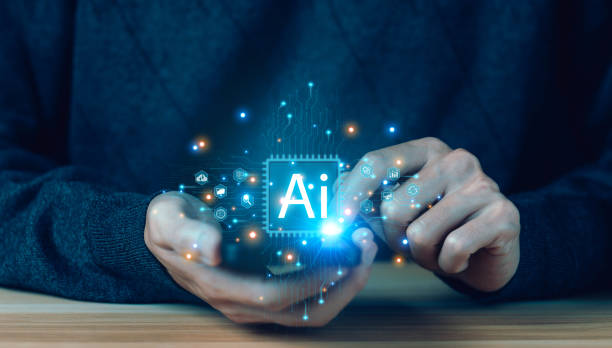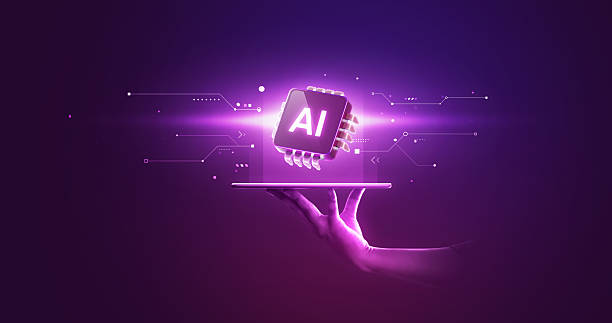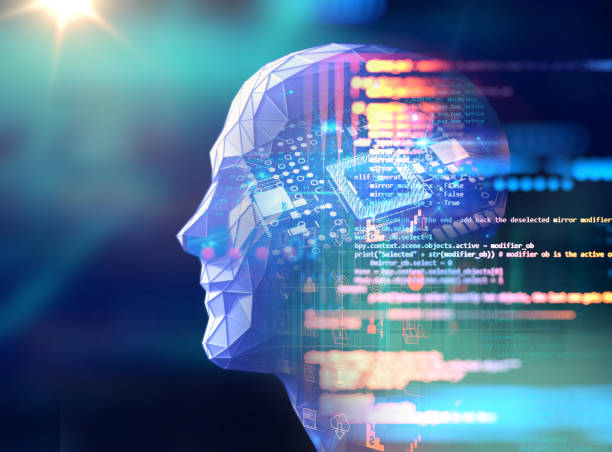What is Artificial Intelligence? Definitions and Basic Concepts

#Artificial_Intelligence (AI) is a branch of computer science that deals with building machines capable of performing tasks that typically require human intelligence.
These tasks can include learning, problem-solving, natural language understanding, pattern recognition, and decision-making.
Artificial intelligence is not just a single concept, but a collection of techniques and approaches aimed at simulating or mimicking human intelligence in machines.
In general, artificial intelligence can be divided into two main categories: #Weak_AI or Narrow AI and #Strong_AI or General AI.
Weak AI excels at performing a specific task, such as playing chess or recognizing faces, while strong AI is capable of performing any intellectual task that a human can.
One of the biggest motivations for developing artificial intelligence is automating processes and increasing efficiency in various industries.
#AI is used in medicine for disease diagnosis, in finance for market prediction, and in manufacturing for improving product quality.
More information about artificial intelligence
Are you losing potential customers due to an unprofessional website? Rasaweb is your answer! With our specialized corporate website design services:
✅ Enhance the credibility and standing of your business
✅ Experience attracting more targeted customers
⚡ Take action now to receive a free consultation!
The History of Artificial Intelligence: From Beginning to Today

The history of artificial intelligence dates back to the 1950s, when scientists like Alan Turing and John McCarthy began exploring the possibility of building intelligent machines.
The Turing Test was one of the first attempts to define machine intelligence.
In the 1960s, programs like ELIZA showed that machines could interact with humans to some extent.
A period of excitement and hope in the 1980s emerged with the advent of Expert Systems, but these systems also faced limitations.
Today, with significant advances in Machine Learning and Deep Learning, artificial intelligence is rapidly evolving.
Deep learning algorithms, especially Deep Neural Networks, have achieved remarkable results in tasks such as image recognition and natural language processing.
Large technology companies like Google, Microsoft, and Amazon are at the forefront of artificial intelligence development, making huge investments in this field.
Read about the history of artificial intelligence on Wikipedia
What is the Difference Between Machine Learning and Deep Learning?

Machine Learning is a subset of #artificial_intelligence that allows machines to learn from data without explicit programming.
Machine learning algorithms identify patterns and relationships in data and use these patterns to make predictions or decisions.
There are various types of machine learning algorithms, including Supervised Learning, Unsupervised Learning, and Reinforcement Learning.
Deep Learning is a subset of machine learning that uses deep neural networks with multiple layers to analyze data.
These networks are capable of learning complex and abstract patterns in data.
Deep learning is particularly effective in tasks such as image recognition, natural language processing, and speech recognition.
The main difference between machine learning and deep learning is in how they learn.
Machine learning often requires manual features to analyze data, while deep learning can learn these features automatically from the data.
For example, in image recognition, a machine learning algorithm may require features such as edges and corners, while a deep neural network can learn these features automatically.
| Feature | Machine Learning | Deep Learning |
|---|---|---|
| Need for manual features | Yes | No |
| Number of layers | Fewer | More |
| Data type | Various types | Mostly unstructured data |
Applications of Artificial Intelligence in Today’s World

The applications of #artificial_intelligence in today’s world are very broad and diverse.
In #medicine, #AI is used for disease diagnosis, drug development, and personalized treatments.
In #finance, #AI is used for fraud detection, market prediction, and risk management.
In #manufacturing, #AI is used to improve product quality, optimize processes, and predict equipment failures.
#Self-driving_cars are one of the most exciting applications of artificial intelligence that can revolutionize transportation.
#Robotics is another area where artificial intelligence plays an important role.
Intelligent robots can work in dangerous or repetitive environments and help humans perform various tasks.
#Artificial_intelligence has a prominent presence in everyday life as well.
From voice assistants like #Siri and #Alexa to movie and music recommendation systems, #artificial_intelligence is increasingly shaping our experience of the digital world.
Learn about applications of artificial intelligence at IBM
Are you dissatisfied with low sales from your online store?
Rasaweb is your solution for having a professional and high-selling online store.
✅ Significant increase in sales and revenue
✅ Easy and enjoyable shopping experience for customers
⚡ Get a free consultation from Rasaweb now!
Advantages and Disadvantages of Using Artificial Intelligence

The use of #artificial_intelligence has numerous advantages and disadvantages.
Among its advantages are increased efficiency, reduced costs, improved accuracy, and the ability to solve complex problems.
#Artificial_intelligence can help humans perform repetitive and tedious tasks and free up their time and energy for more creative work.
However, #artificial_intelligence also has disadvantages.
One of the biggest concerns is the impact of #artificial_intelligence on the labor market.
Automation threatens many jobs and may lead to widespread unemployment.
Another concern is the ethical issues related to the use of #artificial_intelligence.
Decisions made by machines can be discriminatory or unfair.
In addition, there are concerns about data security and privacy.
#Artificial_intelligence algorithms require a lot of data, and this data can be misused.
For the responsible use of #artificial_intelligence, it is necessary to carefully examine these advantages and disadvantages and develop appropriate policies and regulations.
Reviewing the advantages and disadvantages of artificial intelligence at Harvard
Ethical Challenges in Artificial Intelligence Development

The development of #artificial_intelligence poses numerous ethical challenges.
One of the most important of these challenges is the issue of #algorithmic_discrimination.
#Artificial_intelligence algorithms can unintentionally be discriminatory if they are trained on data that itself contains #racial, gender, or social #biases.
Another challenge is the issue of #privacy.
#Artificial_intelligence algorithms need a lot of data to learn and improve their performance, and this data can contain personal information.
To protect the privacy of individuals, it is necessary to develop appropriate policies and regulations regarding the collection, storage, and use of data.
#Accountability is another important ethical challenge in the development of #artificial_intelligence.
When an #artificial_intelligence system makes a mistake, it is difficult to determine who is responsible.
Is it the developer, the user, or the system itself who is responsible? Answering these questions requires careful review and the development of new laws.
Study on artificial intelligence ethics at Harvard University
What Will the Future of Artificial Intelligence Look Like?

Predicting the future of #artificial_intelligence is difficult, but it can be imagined that #artificial_intelligence will play a much more important role in our lives.
Strong #artificial_intelligence (AGI), which is capable of performing any intellectual task that a human can, is still in the early stages of development, but achieving it could create tremendous changes in society.
#Artificial_intelligence can help solve some of the world’s biggest challenges, such as climate change, intractable diseases, and poverty.
However, #artificial_intelligence can also pose risks.
#Controlling_artificial_intelligence and preventing its misuse is one of the most important challenges we face.
To ensure that #artificial_intelligence is used for the benefit of humanity, research and development in this field must be conducted with care and responsibility, and appropriate policies and regulations must be developed.
In the near future, #artificial_intelligence is expected to make significant progress in areas such as #health_and_medicine, #education, and #transportation.
Research on Artificial Intelligence Safety
| Area | Prediction |
|---|---|
| Healthcare | Faster and more accurate disease diagnosis, personalized treatments |
| Education | Adaptive learning, intelligent teachers |
| Transportation | Self-driving cars, intelligent traffic management systems |
How to Learn Artificial Intelligence? Resources and Guidance

Learning #artificial_intelligence can be an exciting and rewarding journey.
There are many resources for learning #artificial_intelligence, including online courses, books, scientific articles, and practical projects.
To get started, you can familiarize yourself with basic concepts such as #machine_learning, #deep_learning, and #neural_networks.
Online courses such as those offered by #Coursera, #edX, and #Udacity can be a good starting point.
For practical learning, you can implement simple projects using tools like #Python, #TensorFlow, and #PyTorch.
Participating in #artificial_intelligence competitions like the #Kaggle competitions can also be a great way to learn and improve your skills.
Most importantly, learning #artificial_intelligence requires patience, perseverance, and continuous practice.
With effort and focus, you can become an #artificial_intelligence expert and play a role in this emerging and exciting field.
Specialized machine learning courses on Coursera
Research shows that 80% of customers trust companies with professional websites more. Does your current website inspire this trust?
With Rasaweb’s corporate website design services, solve the problem of customer distrust and weak online image forever!
✅ Create a professional image and increase customer trust
✅ Attract more sales leads and grow your business
⚡ Get a free consultation
The Impact of Artificial Intelligence on Various Industries

#Artificial_intelligence has a profound impact on various industries and is transforming how they operate.
In the #healthcare_industry, #artificial_intelligence helps to diagnose diseases faster and more accurately, develop drugs, and personalize treatments.
In the #financial_industry, #artificial_intelligence helps to detect fraud, predict markets, and manage risk.
In the #manufacturing_industry, #artificial_intelligence helps to improve product quality, optimize processes, and predict equipment failures.
In the #transportation_industry, #self-driving_cars and intelligent traffic management systems can make transportation safer, more efficient, and more cost-effective.
#Artificial_intelligence is also used in #creative_industries such as #art and #music.
#Artificial_intelligence algorithms can create new works of art and music and assist artists in the creative process.
In general, #artificial_intelligence has the potential to increase productivity, efficiency, and innovation in various industries and improve our lives.
Study on the impact of artificial intelligence on various industries at McKinsey
What Opportunities Does the Future of Work in Artificial Intelligence Hold?

The future of work in #artificial_intelligence is very bright and promising.
With the increasing use of #artificial_intelligence in various industries, the demand for #artificial_intelligence professionals has also increased.
There are many job opportunities in the fields of #machine_learning, #deep_learning, #natural_language_processing, #robotics, and #computer_vision.
Companies are looking for people who can develop, implement, and manage #artificial_intelligence algorithms.
#Artificial_intelligence_engineers, #data_scientists, #data_analysts, and #robotics_specialists are among the popular jobs in this field.
To enter this field, having a degree in related fields such as #computer_science, #electrical_engineering, #statistics, and #mathematics can be helpful.
In addition, learning practical skills such as programming, working with #artificial_intelligence tools, and familiarity with various algorithms is essential.
By gaining experience and expertise, you can become an #artificial_intelligence expert and work in large technology companies, start-ups, and research organizations.
The best artificial intelligence jobs on Forbes
FAQ
| Question | Answer |
|---|---|
| 1. What is Artificial Intelligence (AI)? | It is a branch of computer science that aims to create machines capable of simulating human intelligence and performing tasks that require human thinking, such as learning, problem-solving, and decision-making. |
| 2. What are the main types of artificial intelligence? | They can be classified into weak artificial intelligence (Narrow AI) that focuses on a specific task, general artificial intelligence (General AI) that possesses comprehensive human capabilities, and super artificial intelligence (Super AI) that surpasses human intelligence. |
| 3. Mention some common artificial intelligence applications in our daily lives. | They include voice assistants (such as Siri and Alexa), recommendation systems (such as Netflix and Amazon), self-driving cars, facial recognition systems, and spam filters. |
| 4. What is the difference between Artificial Intelligence and Machine Learning? | Artificial intelligence is the broader concept of creating intelligent machines, while machine learning is a subset of artificial intelligence that focuses on enabling systems to learn from data without explicit programming. |
| 5. What is Deep Learning? | It is a subset of machine learning that uses multi-layered artificial neural networks (deep neural networks) to process data and discover complex patterns, and it is used in image and speech recognition. |
| 6. What are the most prominent benefits of Artificial Intelligence? | Improving efficiency and productivity, automating repetitive tasks, making better decisions based on big data analysis, and developing solutions to complex problems in fields such as medicine and science. |
| 7. What are the main challenges facing the development and deployment of Artificial Intelligence? | They include the need for huge amounts of high-quality data, privacy and security issues, bias in data and algorithms, and high development and maintenance costs. |
| 8. Does artificial intelligence raise ethical or social concerns? | Yes, it raises concerns about privacy, algorithmic bias, job losses due to automation, responsibility for errors committed by intelligent systems, and the need for a regulatory framework. |
| 9. How can artificial intelligence affect the future of the labor market? | It can lead to the automation of some routine jobs, but it will also create new jobs that require advanced skills in developing, operating, and maintaining artificial intelligence systems. |
| 10. What are some modern or promising technologies in the field of artificial intelligence? | They include advanced natural language processing (NLP) (such as large language models like ChatGPT), computer vision, robotics, and generative artificial intelligence. |
And other services of Rasa Web Advertising Agency in the field of advertising
Smart Digital Advertising: A creative platform to improve website traffic with smart data analysis.
Smart Data Analysis: A dedicated service to grow customer attraction based on attractive UI design.
Smart Digital Branding: An effective tool for customer attraction using attractive UI design.
Smart Customer Journey Map: A combination of creativity and technology for online growth through the use of real data.
Smart Custom Software: A creative platform to improve digital branding with attractive UI design.
And hundreds of other services in the field of internet advertising, advertising consulting, and organizational solutions
Internet Advertising | Advertising Strategy | Advertorial
Resources
What is artificial intelligence and how does it work?
,The importance of publishing artificial intelligence publications for mental health
,Which jobs will artificial intelligence replace?
,What is artificial intelligence? One hundred percent of artificial intelligence in one article
? Are you ready to transform your business in the digital world? Rasaweb Afarin Digital Marketing Agency, with expertise in modern UI website design and comprehensive marketing strategies, is with you to have a powerful and impactful presence in the online space.
📍 Tehran, Mirdamad Street, next to the Central Bank, South Kazerun Alley, Ramin Alley, No. 6



